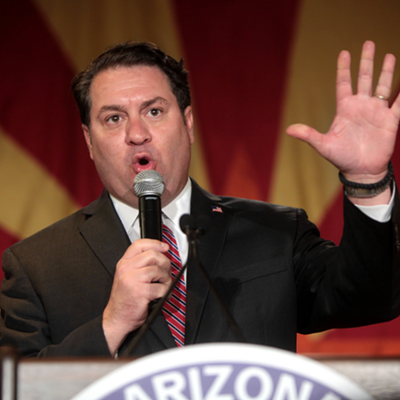SUPREME COURT TO BREWER: FORGET ABOUT IT
When we last left the Independent Redistricting Commission, Gov. Jan Brewer was trying to get some clarification from the Arizona Supreme Court about why it ordered that IRC chairwoman Colleen Mathis be reinstated following Brewer's removal of her in early November ("Letter Imperfect," Nov. 24).
For those of you who haven't followed the redistricting battle over the last few months: Tea Party activists have been pushing the narrative that the Independent Redistricting Commission is a tool of the Democrats, based on the idea that Mathis, a political independent, was a Democrat in disguise who was rigging the maps that define Arizona's political boundaries to give Democrats an unfair advantage.
We find that a hard assertion to believe, given that the congressional maps drawn up so far have four solid Republican districts, two solid Democratic districts and three competitive districts—meaning that in a good year, Republicans could hold seven of the state's nine districts, and in a worst-case-scenario year, they'd still hold four out of the nine, or nearly half of them. If this is a Democratic plot, it's terrible.
But anyway: On Nov. 1, Brewer called a special session of the Arizona Legislature so that GOP members of the Senate could provide the two-thirds majority necessary to approve Mathis' removal from the redistricting commission based on trumped-up charges that she had committed "gross misconduct" and "substantial neglect of duty," which is the constitutional standard required to remove a member of the IRC.
That led to a fight in the Arizona Supreme Court, which ruled that Brewer had overreached by removing Mathis, who was then reinstated as chairwoman via a brief court order.
Brewer, who didn't understand what the court said, asked for some details. Just before Thanksgiving, the Supreme Court delivered the clarification that Brewer was looking for—but it was almost certainly not the answer she wanted.
The Supreme Court's response explained that the justices put Mathis back on the five-member Independent Redistricting Commission because nothing that Brewer had alleged in her removal letter measured up to "gross misconduct" or "substantial neglect of duty."
The justices explained that the problem with Brewer's letter removing Mathis "is based on the letter's substance, not its format. The letter does not, as a matter of law, identify conduct that provides a constitutional basis for removal."
The court shot down the two arguments that Brewer leaned on in removing Mathis—that the commission had violated open-meeting laws, and that the draft maps produced by the commission were unconstitutional.
"The governor's disagreement with commissioners over whether they have properly considered constitutional criteria for adjusting the grid map before they have completed final maps is not, as a matter of law, a constitutional basis for removal," the justices wrote.
WHEN AT FIRST YOU DON'T SUCCEED ...
The court's clarification shot down the arguments of GOP legal geniuses who had suggested that the court only reinstated Colleen Mathis to the Independent Redistricting Commission because Gov. Jan Brewer had screwed up the process of removing her, and that she merely had to write a "better letter" to get her off the IRC.
It also laid to rest the argument from Brewer's private attorney, Lisa Hauser, that Brewer could remove a commissioner for any reason she determined to be "gross misconduct," even if it was wearing a purple dress to the meetings.
Short of somehow removing Supreme Court justices to pack the court with new judges that would approve of anything Brewer does, new options of stopping the IRC from moving forward are relatively limited.
Some lawmakers, reluctant to give up entirely, were urging Brewer to consider calling a special session before Wednesday, Nov. 30, to add a ballot proposition to the Feb. 28 presidential primary that would somehow reform the IRC or give the power of redistricting back to the state lawmakers, who were stripped of the power when voters created the IRC back in 2000.
Supporters of the idea of a special election in February reasoned that more Republicans would be coming to the polls for the presidential primary, since Democrats already have a presidential nominee, and independents aren't allowed to vote in presidential primaries in Arizona.
But we've heard that polling commissioned by GOP insiders suggested that even Republicans were reluctant to support the kinds of changes that lawmakers were proposing, so Brewer was in no rush to call a special session.
As of our deadline, no special session had been called—and it was unclear whether such an election would even be allowed to go forward, given that the U.S. Justice Department would need to approve the changes to the IRC as well.
While GOP lawmakers were trying to figure out their next move, the IRC itself got back to work this week, holding a series of public meetings to review the comments they'd received on the draft maps.
CREATING UNHAPPY VOTERS
It appears that Democratic and independent voters weren't particularly happy with Gov. Jan Brewer's move to kick chairwoman Colleen Mathis off the Independent Redistricting Commission in the first place.
A Public Policy Polling survey of voters showed that overall, 43 percent of voters disapproved of Mathis' removal, while just 31 percent approved of the move.
But there's a sharp split between the political parties, which goes a long way toward explaining why GOP lawmakers are making such a big deal out of it.
More than half of GOP voters—54 percent—approved of Brewer's move to remove Mathis, while just 16 percent were opposed to it. But among Democrats, 72 percent disapproved of the removal, while just 13 percent approved of it. Independent voters didn't like the idea much, with 41 percent opposing it, and just 19 percent saying it was the right thing to do.
Many of those surveyed said they didn't know much about the proposed congressional maps. A full 42 percent hadn't formed an opinion about them, while 25 percent said they like the maps, and 34 percent said that they didn't like them.
Speaking of unhappy voters: That same Public Policy Polling survey shows that voters aren't thrilled with Brewer right now. Only 42 percent of the voters approve of the job that Brewer is doing, compared to the 49 percent of voters who disapprove.
We doubt that Brewer's effort to undermine the IRC with a bunch of bullshit charges helped her approval ratings, but we'd guess she was already on a downward slide before that ever happened.
The latest numbers are her lowest since April 2010, before she enjoyed the big boost she got from signing SB 1070, the immigration bill that became perhaps the best-known bit of Arizona law since the alt-fuels debacle.
Still, for all her unpopularity, only 32 percent of those surveyed said they'd support a recall of Brewer, compared to the 58 percent who were opposed to the idea of a recall.
The Public Policy Polling survey—which surveyed 500 voters between Nov. 17 and Nov. 20—had a whole bunch more we'd like to unpack for you, including the fact that it could be a real contest between Democrat Richard Carmona and Republican Congressman Jeff Flake in next year's U.S. Senate race. Unfortunately, we're all out of room, but you can find details on The Range, our daily dispatch.







